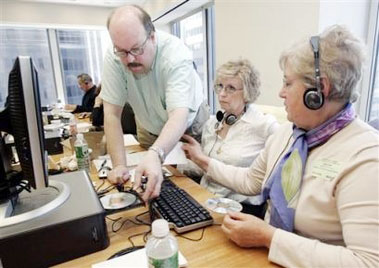The operators managed generally to maintain their composure even as word
spread that what initially appeared to be a tragic accident was actually a
choreographed terrorist attack involving two planes and both towers.
Sirens screamed in the background as the callers pleaded for help. Although
there were no voices, their desperation was evident in heavy, audible breathing
on the other end of the operators' calls.

Glen Corbett, left, a
professor of fire science at John Jay College, assists Rosemary Cain,
center, and Barbara Hetzel as they listen to compact discs of emergency
calls from Sept. 11, 2001, released in New York Friday March 31, 2006.
[AP] |
"If you feel like your life is in danger, do what you must do, OK?" one
dispatcher told a caller at 9:02 a.m., just a minute before the second plane
hit. "I can't give you any more advice than that."
The comment was typical of the frustration that came through amid the calm
professionalism.
"All right, we have quite a few calls," said a fire operator.
"I know," said a police operator. "Jesus Christ."
Many dispatchers complained about computers failing in the chaos.
"Oh goodness. Hold on a second, because we are so backed up here," a fire
dispatcher told one caller. "Because we have so much information on here, that
our computers are down. OK?"
In the background of another call made from the 105th floor of the north
tower at 9:17 a.m., a public address announcement could be heard in the
background: "We aware of it down here. The condition seems to have subsided."
Sally Regenhard, one of the plaintiffs whose firefighter son was killed on
Sept. 11, said the tapes showed that the operators were untrained to tell people
how to save their lives.
"I'm hoping that the public and the system will learn how unprepared the City
of New York and the Port Authority were on that day," Regenhard said.
Many of the operators told frantic callers to stay put and wait for help,
which fire dispatcher supervisor David Rosenzwieg said is standard procedure in
high-rises when fires break out on lower floors.
"Telling people to stay ¡ª for some reason people think that's the wrong thing
to do," Rosenzwieg said Friday. "But the same instructions saves lives every
day."
Rosenzwieg said some dispatchers were so traumatized by their encounters with
the trade center victims they never came back to the job. Others retired early.
"Unfortunately, they took it very much to heart," he said.
Police Commissioner Ray Kelly said the police 911 operators "displayed
professionalism and compassion under the most trying of circumstances, often
staying on the line with anguished callers until the very end."
At 9:47 a.m., one police operator did exactly that, telling another
unidentified caller, "Yes, I'm here, I'm not going to go nowhere. ... You know
there are people there trying to get you all out right now, all right? You're
not by yourself."
The dispatcher then took a telephone number of the caller's family and
promised to reach them. Then the call went dead: "And who is this? Hello?"
The first transcripts released as part of the Times lawsuit came last August,
when thousands of pages of oral histories of firefighters and emergency workers,
as well as radio transmissions, were released. The Port Authority of New York
and New Jersey, which owned the trade center and has its own police force,
released all its emergency recordings in 2003.
The Sept. 11 commission concluded in 2004 that the operators did not have
enough information to allow more people to escape from the twin towers.
"Are they still standing?" one dispatcher asked at 10:15 a.m., 16 minutes
after the south tower collapsed. "The World Trade Center is there,
right?"